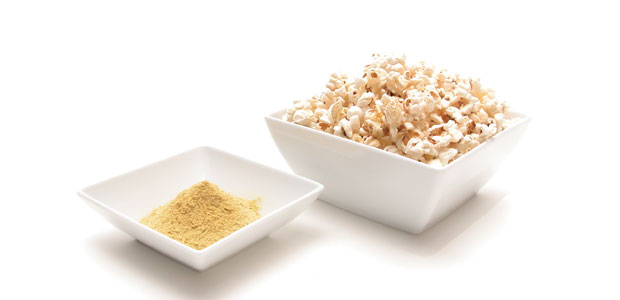Advertisement
Nutritional Yeast
Yeasts are a group of microscopic single-celled fungi, relatives of the mushroom. More than 100 different species are known. Nutritional yeasts can be used as condiments and supplements. They are rich in B vitamins. The yellowish colour of the yeast comes from the concentration of the B vitamin riboflavin. Some nutritional yeasts contain high-quality protein, … Continued

Yeasts are a group of microscopic single-celled fungi, relatives of the mushroom. More than 100 different species are known.
Nutritional yeasts can be used as condiments and supplements. They are rich in B vitamins. The yellowish colour of the yeast comes from the concentration of the B vitamin riboflavin. Some nutritional yeasts contain high-quality protein, with both essential and nonessential amino acids, as well as the vitamins niacin, thiamin, biotin, and folic acid and minerals selenium, chromium, zinc, phosphorus, and magnesium.
Gluten-Free
Primary-grown nutritional yeast is grown on mixtures of beet and sugar cane molasses. After it is grown and the fermentation process is complete, the yeast is harvested, washed, pasteurized, and dried at a high temperature. As a result, this yeast is guaranteed to be free of the Candida albicans strain of yeast. It contains no gluten.
This yeast is very easy to digest. Its delicious nutty-roasted taste lends itself to many cuisines. Two teaspoons (10 mL) of yeast flakes provide one microgram of vitamin B12, the recommended daily intake for most adults. I sprinkle it on my cereal, spaghetti, popcorn, and mix it into smoothies. Kept in a cool dry place, it can last for a year.
Alternatives
Brewer’s yeast is a byproduct of the brewing process. It is grown on hops, grain, and malt and develops a bitter flavour. The bitterness is removed through a process which can lower the nutritional quality of the yeast. Sold in tablet or powdered form, it can be stirred into beverages or sprinkled into cereals.
Torula yeast is grown on waste sulphite liquid from wood pulp. Despite its range of B vitamins, minerals, and proteins, some consumer groups have questioned the safety of its growing methods.
Grade A Yeast
When purchasing nutritional yeasts, the best are those produced as food supplements, grown on molasses or sugar beets. These are pleasant tasting and do not require further processing. Whether you are cutting back on cheese or looking for a non-animal source of B vitamins, nutritional yeasts are a must for natural-foods pantries.
Recipe




